We face many challenges as parents, but toilet training may feel like one of the more daunting ones. And now that your child seems old enough to begin potty training, you also wonder how potty training works in childcare. Relax. Like every other aspect of daycare, you and your child’s teacher will work as partners in the process of potty learning. Potty training while in a quality childcare or daycare setting may be easier than it is at home.
At Premier Academy, your toddler sees other children visiting the bathroom, which can create a powerful incentive and example. Teachers are usually very experienced in potty training and can offer you a lot of support. Many schools have toddler-sized toilets and sinks, which can make the process much less intimidating. Ask for the teacher’s insights, and try not to compare your child to other children in the center. Soon, your days of changing diapers will be over and your toddler will seem oh, so grown up.
Tips for Potty Training at Daycare or Childcare Center:
- Get on the same page. Talk with your child’s teachers about the approach they use. They can help you watch for signs of readiness. These signs may include staying dry for lengths of time, expressing an interest in using the toilet, and being able to pull clothes up and down. You and your child’s teachers will work together to develop a plan for potty training. Share your own philosophy and any concerns you have. Mutually agree on how you’ll handle potty training and make sure that you consistently follow the plan during the evenings and weekends. In order to provide you the best childcare, we atPremier Academyare dedicated to maintaining open lines of communication between parents and teachers regarding potty training.
- Communicate, communicate, communicate. Let your child’s teacher know when your child last went potty when you drop off in the morning. Ask for the same information when you pick your child up at the end of the day, and read the Tadpole reports for detailed information. Find out about the times your child uses the bathroom at school and try to duplicate this schedule at home.
- Come prepared. Accidents are bound to happen during the first few weeks of potty training, so make sure your toddler is prepared to cope with potty accidents. Be sure to send your child to daycarewith plenty of clean clothes. Skip the onesies, blue jeans, or overalls, and opt for soft, loose pants with an elastic waistband. These clothes help your child be more independent, and they also simplify the inevitable changes. Send your child in shoes that come off easily and don’t forget extra socks.
- Expect setbacks. Potty training is a major developmental milestone and it’s very common for children to make progress and then regress. Try not to get discouraged or express frustration to your toddler. Make sure that your child is really ready before you start potty training. The age of readiness varies from child to child, but most kids are ready to potty train between 20 and 30 months. Take it slow and use a relaxed, positive approach. Talk with your child’s teacher if you have questions or just need some extra support. Premier Academycan provide you with plenty of information regarding when your child is ready to start potty training. Let us be your greatest resource!
- Push the fruits and veggies. What does nutrition have to do with potty training? Constipation is a common problem when children don’t eat enough fiber. Children sometimes develop a fear of toileting if they’ve experienced painful stools. Eating fruits and vegetables helps keep their digestive system regulated.
- Accommodate special needs. A child with developmental or physical delays may need extra support to potty train. Talk with the teacher at your daycareabout ways to help, which might include delaying potty training, using a visual chart, or practicing the steps of pulling down pants or washing hands prior to starting potty training.
As you go through the potty training process, try to keep perspective. Some children are very motivated and learn to use the toilet quickly. Others need more time before they completely master this developmental task. Remember that both you and your child are doing the best you can. Before long, your child will be diaper-free and ready for the next adventure.

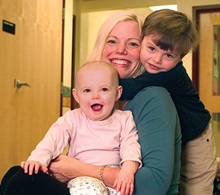 With the winter months coming upon us, we find that our children are at risk for infections and colds. Taking care of a sick toddler isn’t fun. But taking care of two sick children is worse. It means more misery and sleepless nights — and for you, more missed days of work.
With the winter months coming upon us, we find that our children are at risk for infections and colds. Taking care of a sick toddler isn’t fun. But taking care of two sick children is worse. It means more misery and sleepless nights — and for you, more missed days of work.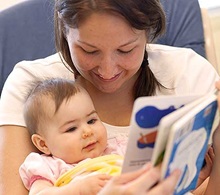 Reading to infants contributes to the development of their growing brains and gives them a good start towards a lifelong love of reading and good literature. When you read to babies, it can also help speech development as they are taking in information and beginning to learn about speech patterns. In addition, synapses connect between your infant’s neurons as you read aloud, positively affecting child development in many areas. Choosing a childcare that understands the importance of reading can set your child on the path to healthy development.
Reading to infants contributes to the development of their growing brains and gives them a good start towards a lifelong love of reading and good literature. When you read to babies, it can also help speech development as they are taking in information and beginning to learn about speech patterns. In addition, synapses connect between your infant’s neurons as you read aloud, positively affecting child development in many areas. Choosing a childcare that understands the importance of reading can set your child on the path to healthy development.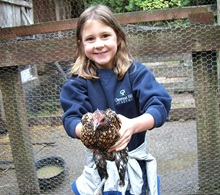 You’ve probably heard about the benefits of nature and outdoor play for children. According to the National Wildlife Federation, outdoor play boosts fitness and decreases the risk of childhood obesity; increases focus and academic achievement at your child’s daycare; and reduces stress and increases feelings of well-being.
You’ve probably heard about the benefits of nature and outdoor play for children. According to the National Wildlife Federation, outdoor play boosts fitness and decreases the risk of childhood obesity; increases focus and academic achievement at your child’s daycare; and reduces stress and increases feelings of well-being.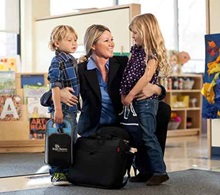 Work-life balance has long been considered a strict separation between work and personal life, but the lines between the two have gradually become blurred, attributable to the technology advancements which allow people to be constantly connected and businesses to be active and accessible at all times without boundaries. With the capabilities of modern technology, work-life integration, a concept in which work and life are intertwined, is emerging and is perceived to be the future of the working world. The new reality is that many fields allow employees to work remotely at least one day of the work week. This, coupled with an ever increasing global workplace, has brought change to the traditional nine to five work day.
Work-life balance has long been considered a strict separation between work and personal life, but the lines between the two have gradually become blurred, attributable to the technology advancements which allow people to be constantly connected and businesses to be active and accessible at all times without boundaries. With the capabilities of modern technology, work-life integration, a concept in which work and life are intertwined, is emerging and is perceived to be the future of the working world. The new reality is that many fields allow employees to work remotely at least one day of the work week. This, coupled with an ever increasing global workplace, has brought change to the traditional nine to five work day.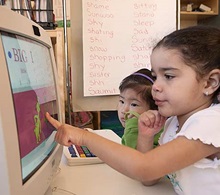 As technology becomes more accessible and affordable, more and more families are using it and when you are looking for a Nebraska daycare, you should look for a center that understand the correct use of technology for all ages. According to a 2013 study by Common Sense Media, an organization dedicated to helping families use technology wisely, 75 percent of children under the age of 8 have access to a tablet or mobile device, an increase of 25 percent in just two years. And that number is growing every year.
As technology becomes more accessible and affordable, more and more families are using it and when you are looking for a Nebraska daycare, you should look for a center that understand the correct use of technology for all ages. According to a 2013 study by Common Sense Media, an organization dedicated to helping families use technology wisely, 75 percent of children under the age of 8 have access to a tablet or mobile device, an increase of 25 percent in just two years. And that number is growing every year.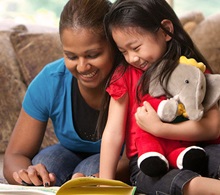 90% of parents cited academic preparedness as being the most important factor in their child’s quality childcare. They want to ensure that their children are prepared to meet or exceed academic expectations and possess the ability to apply their skills in reading, writing and math.
90% of parents cited academic preparedness as being the most important factor in their child’s quality childcare. They want to ensure that their children are prepared to meet or exceed academic expectations and possess the ability to apply their skills in reading, writing and math.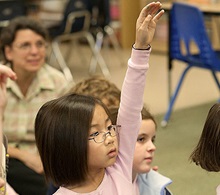 As young children transition to the next classroom at Premier Academy there can be some anxiety for both the child and the parents. Separation anxiety is a normal reaction. Leaving the familiar faces of teachers and entering into a new environment can be difficult for anyone.
As young children transition to the next classroom at Premier Academy there can be some anxiety for both the child and the parents. Separation anxiety is a normal reaction. Leaving the familiar faces of teachers and entering into a new environment can be difficult for anyone.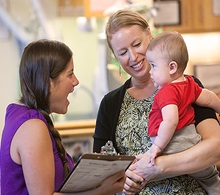 Teachers are often surprised to find out that parents in professional careers can be insecure or uncomfortable when it comes to talking about their child. Even parents with post-graduate education in child development often have feelings of anxiety and insecurity when communicating with teachers about their own children. So how can parents develop a positive parent-teacher relationship in order to work together for the success of your child? Here at Premier Academy it is our goal to make sure each and every parent feels comfortable communicating with our teachers and management. This is the very definition of providing you quality childcare.
Teachers are often surprised to find out that parents in professional careers can be insecure or uncomfortable when it comes to talking about their child. Even parents with post-graduate education in child development often have feelings of anxiety and insecurity when communicating with teachers about their own children. So how can parents develop a positive parent-teacher relationship in order to work together for the success of your child? Here at Premier Academy it is our goal to make sure each and every parent feels comfortable communicating with our teachers and management. This is the very definition of providing you quality childcare.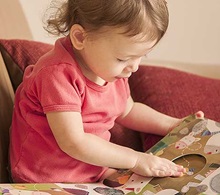 Reading is a perfect way to spend quality time with your children. While helping children to develop essential literacy and reading skills, stories spark children’s imaginations and create memories that last a lifetime. Here are a few simple tips from Barefoot Books for making storytime a memorable and enjoyable experience for families.
Reading is a perfect way to spend quality time with your children. While helping children to develop essential literacy and reading skills, stories spark children’s imaginations and create memories that last a lifetime. Here are a few simple tips from Barefoot Books for making storytime a memorable and enjoyable experience for families.